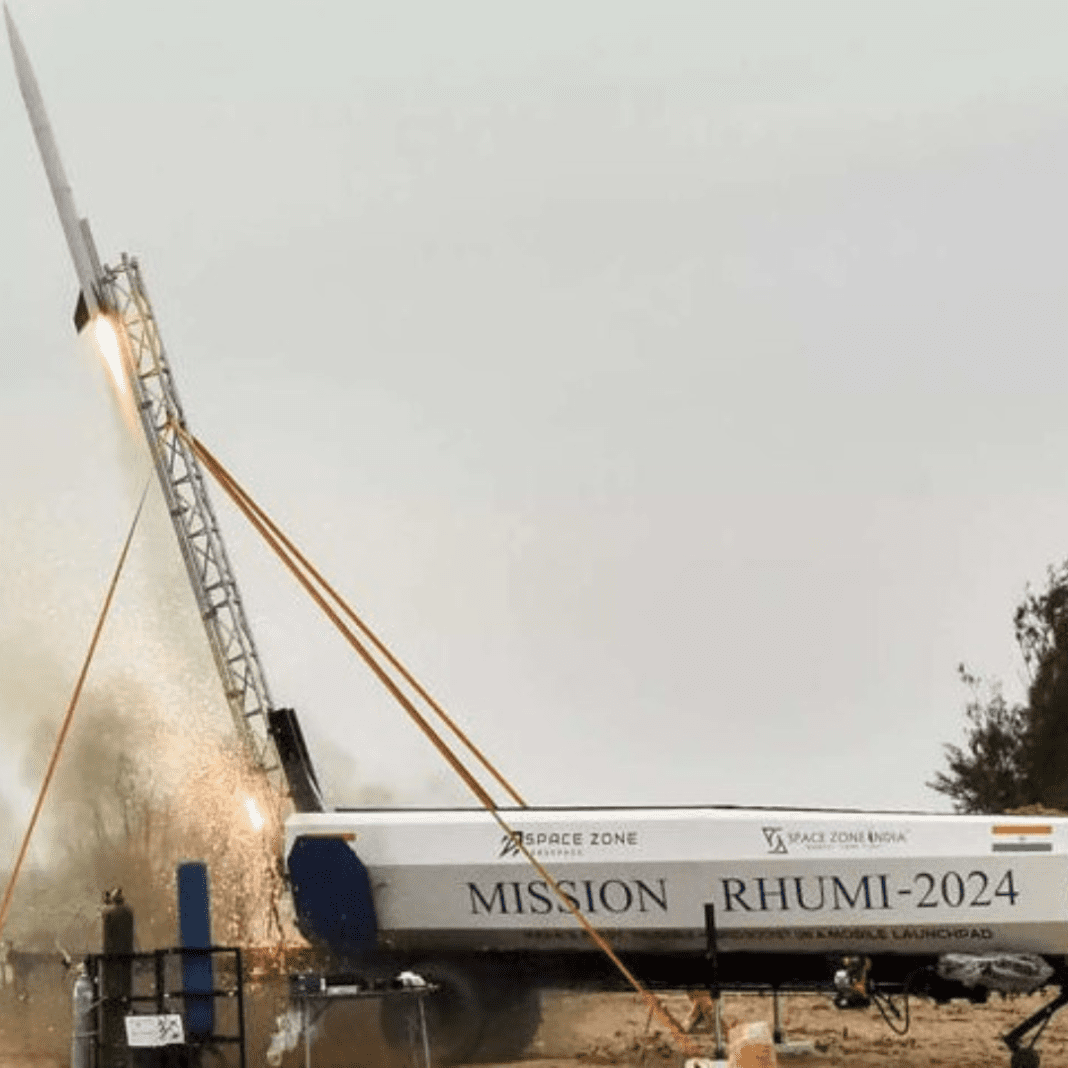Introduction to RHUMI and Its Mission
Space Zone India, a startup located in Tamil Nadu, has successfully launched RHUMI-2024, its first reusable hybrid rocket, marking a major advancement in space technology. This mission is part of their ongoing efforts to address global environmental challenges like global warming and climate change. An exciting new chapter in India’s space exploration efforts was opened with the launch, which took place on a transportable platform along the picturesque East Coast Road close to Chennai.
For the last two years, Space Zone India, which has its main office in the busy metropolis of Chennai, has been working on a number of initiatives under Mission RHUMI. The RHUMI rocket, which stands at 3.5 meters tall, was launched early in the day, slightly delayed from its planned 7:00 AM schedule to 7:25 AM due to adjustments needed for the weather conditions. Despite these challenges, the mission proceeded smoothly, showcasing the startup’s innovative approach to space exploration.
Technological Innovations in RHUMI-2024
The RHUMI rocket is powered by a generic-fuel-based hybrid motor, a technology that combines the best of both solid and liquid rocket fuels, making it both powerful and efficient. This hybrid motor is paired with an electrically triggered parachute deployer, which ensures the rocket’s safe return to Earth, making it reusable for future missions. This reusability is a significant breakthrough in reducing the costs associated with space missions, aligning with global efforts to make space exploration more sustainable.
The rocket was launched from a mobile launch pad, a first-of-its-kind initiative that adds an extra layer of flexibility to the mission. This mobile platform allows the launch to be conducted from various locations, depending on the specific needs of the mission, and represents a significant advancement in how rocket launches are carried out. The ability to launch from a mobile platform is particularly valuable in a country like India, where diverse geographical conditions can impact the success of space missions.
During its flight, RHUMI reached an altitude of about 35 kilometers, where it deployed its payload, consisting of three CUBE satellites and 50 Pico satellites. These satellites are designed to gather crucial data on atmospheric conditions, including cosmic radiation intensity, UV radiation levels, and air quality. This data is vital for understanding the impact of global warming and climate change on our planet, and the success of this mission marks a significant contribution to environmental research.
The Impact of Mission RHUMI-2024
Mission RHUMI-2024 is a pioneering effort that has garnered attention not only for its technological innovations but also for its potential impact on the space industry. The reusable nature of the RHUMI rocket represents a major step forward in making space exploration more cost-effective. By reducing the financial burden associated with launching rockets, Space Zone India is paving the way for more frequent and accessible space missions.
Furthermore, the mission’s focus on environmental research highlights the growing importance of space technology in addressing global challenges. The data collected by the satellites launched during this mission will provide valuable insights into the state of our planet’s atmosphere, helping scientists and researchers develop more effective strategies to combat climate change.
In addition to its technological achievements, Mission RHUMI-2024 also reflects a commitment to sustainability. By utilizing a hybrid motor and focusing on reusability, the mission minimizes its environmental impact, aligning with global efforts to make space exploration more eco-friendly. This approach sets a new standard for future space missions, emphasizing the need for sustainable practices in all aspects of space technology.
The successful launch of RHUMI-2024 also underscores India’s growing prominence in the global space industry. As the country continues to innovate and push the boundaries of what is possible in space exploration, missions like RHUMI serve as a testament to the talent and creativity of India’s scientific community. The mission’s success is a source of pride for the nation and a clear indication that India is on the path to becoming a leader in space technology.
Conclusion of the Launch
The launch of RHUMI-2024 by Tamil Nadu-based Space Zone India is a powerful demonstration of the potential that small startups have to make significant contributions to the space industry. By focusing on sustainability, reusability, and environmental research, Space Zone India has not only achieved a technological breakthrough but has also set a new standard for future space missions. The success of Mission RHUMI-2024 is a clear indicator that India’s space industry is evolving rapidly, with startups playing a crucial role in this transformation.
As the RHUMI rocket returns to Earth, its data will undoubtedly play a vital role in shaping our understanding of climate change and global warming. Space Zone India’s achievements serve as a reminder of the importance of innovation, sustainability, and dedication in the pursuit of scientific progress.




